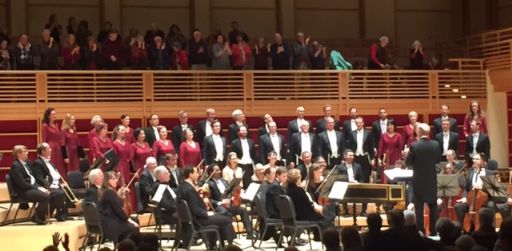|
Symphony
FROM THE NEW WORLD TO THE OLD WORLD
by Peter Lert
Saturday, June 14, 2025
Chamber
MC2 DUO RECITAL CLOSES 222'S SEASON
by Terry McNeill
Saturday, June 14, 2025
Choral and Vocal
CANTIAMO SONOMA'S LUSCIOUS A CAPELLA SINGING IN SEASON ENDING CONCERT
by Pamela Hicks Gailey
Sunday, June 8, 2025
Symphony
SRS SEASON ENDS WITH RESOUNDING TA-TA-TA-BANG
by Terry McNeill
Sunday, June 1, 2025
Symphony
YOUTHFUL VIRTUOSITY ON DISPLAY AT USO'S MAY CONCERTS
by Peter Lert
Saturday, May 17, 2025
Symphony
MYSTICAL PLANETS AND LIVELY GERSHWIN ORTIZ AT FINAL SRS CONCERT
by Peter Lert
Sunday, May 4, 2025
Symphony
VSO'S CONCERT MUSIC OF TIME, MUSIC OF PLACE
by Peter Lert
Sunday, April 27, 2025
VOCAL ELEGANCE AND FIRE AT THE 222'S RECITAL APRIL 26
by Pamela Hicks Gailey
Saturday, April 26, 2025
CANTIAMO SONOMA SINGS AN INSPIRED GOOD FRIDAY MOZART REQUIEM CONCERT
by Pamela Hicks Gailey
Friday, April 18, 2025
DRAMATIC SHOSTAKOVICH SYMPHONY CLOSES PHILHARMONIC'S 25TH SEASON
by Terry McNeill
Sunday, April 13, 2025
|
 |
 The Messiah's "Amen" Chorus Dec. 18 in Weill (C. Greene Photo) |
A MAJESTIC ABS MESSIAH ORATORIO RESOUNDS IN WEILL DEC. 18
by Joanna Bramel Young
Sunday, December 18, 2016
San Francisco’s American Bach Soloists (ABS) presented Handel’s incomparable oratorio Messiah, HWV 56, to a sold out Weill Hall Dec. 18. It was a celebratory afternoon.
In the fashion ABS audiences have learned to expect, conductor Jeffrey Thomas brought out the best of orchestra, chorus and soloists with his eminently tasteful and impeccably nuanced direction.
Prior to the opening measures early arrivals were reading Mr. Thomas’ informative program notes, which stated that Handel was involved with London’s Foundling Hospital (which cared for and educated poor and abandoned children), and for which the English-language Oratorio was created in 1741 to raise money for the Hospital. The first London performance in 1743 was received with great acclaim and critical success.
From the opening Sinfony to the final Amen Chorus, the music unfolded with majesty. In the initial recitative, “Comfort Ye My People,” tenor Derek Chester sang with compelling intensity, with a powerful crescendo at ‘The Voice of Him that Crieth in the Wilderness.” In the following aria, “Ev’ry Valley,” the coloratura ornaments were eloquently negotiated by Mr. Chester.
Unlike past performances attended by this reviewer, the four soloists were not placed in front of the orchestra, and were placed at the center of the stage, behind the instrumentalists.
With the placement their voices blended well with the orchestra, and everything (chorus, orchestra, soloists) could be heard with great clarity.
The early mood was altered when the Chorus sang “And the Glory of the Lord Shall be Revealed” with a lilting and dancing 6/8 rhythm. The concluding note was beautifully full and precisely in tune and a few “sighs” were heard in the Hall. The 33-voice Choir was supple and balanced throughout the concert and created with breathtaking artistry a clear rendering of Handel’s text.
In another recitative baritone Mischa Bouvier’s sonorous deep voice resonated in “…and I will Shake the Heav’ns and the Earth.” The word “shake” was dramatized by ornamented passages up and down the scale, with the orchestra punctuating the words with an emphatic dotted rhythm. Mr. Bouvier’s virtuosity made the recitative sound effortless.
In the next alto aria “But Who May Abide The Day of his Coming” the ABS sometimes has a countertenor sing the role, but here contralto Emily Marvosh sang it, and the strings added drama to the words “He is like a Refiner’s Fire” with shimmering bows playing quick, strong rhythms below the voice line.
The Chorus’ performance of “For Unto Us a Child is Born” displayed awe-inspiring vocal dexterity in long coloratura passages: first the sopranos entered, then the lower voices swelling to “Wonderful, Councellor” with the orchestra at full volume. Always in discreet yet firm control, Mr. Thomas brought forth a thrilling dramatic effect in the Chorus’ “Glory to God in the Highest,” which grew into a great fortissimo fugue and finally ended pianissimo with a transfixing and luminous tone color.
One of the most brilliant arias in the work, “Rejoice Greatly,” was radiantly sung by soprano Hélène Brunet, where the jubilant orchestra played in a lilting 6/8 tempo and provided rich support for her soaring ornaments.
More of Handel’s surprises emerged during the concert’s second half, especially when Ms. Marvosh sang “He was Despised and Rejected of Men.” Here the conductor made the most of contrasts, making familiar music always sound fresh. In the words “He Gave His Back to the Smiters” the violins played strong dotted notes and Mr. Thomas chose a slow tempo for the aria, dramatizing the pain of the words. The Chorus movement “He Trusted in God” was a great fugue and the voices intertwined in intricate counterpoint. Every word could be heard in spite of the now quick tempo.
Enhancing the conclusion of the Oratorio timpani and natural trumpets were added, and trumpeter Timothy Will joined Mr. Bouvier in “The Trumpet Shall Sound,” playing flawlessly with his difficult-to-control Baroque horn. The “Amen” chorus consisted of a majestic fugue beginning with bass singers, and then adding higher voices. The united forces built to a triumphant climax, bringing the audience to their feet in a long and spirited ovation.
This performance came shortly after a Friday night ABS Messiah concert in San Francisco’s Grace Cathedral, and also followed the group’s 2014 Weill Hall debut with yet another glorious Messiah. The ABS and this noble music rarely fail to elevate the spirit.
|

